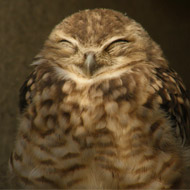
Species immune to plague bacteria
Western burrowing owls living alongside mammals that are prone to catching the plague are not infected with the bacteria that causes the disease, according to a study led by Boise State University.
The finding, reported by Wired, presents scientists with the opportunity to test if burrowing owls could protect humans from this deadly infection.
A species of conservation concern throughout many western states, burrowing owls nest underground, often re-using the burrows of rodents. As well as their cute and fluffy appearance, burrowing owls also have an endearing habit of lining their nests with mammal dung. It is thought that the poo attracts insects that the owls feed on.
Biologist Dr. Jim Belthoff from Boise State University has spent many years studying the creatures and noticed that the owls also seem to have a lot of fleas.
“We considered the fleas a nuisance, as they would jump on us as we captured and banded the owls, and they would infest our field vehicles,” he told Wired.
Jim knew that burrowing owls used ground squirrel and parry dog burrows - both of which host fleas that carry the plague bacteria Yersinia Pestis. So, he and his team set out to discover how the fleas affected the owls and what kind of fleas they were.
After camping for many nights, collecting almost 6,000 fleas, the team found no evidence of the plague bacteria in the owl fleas they collected. They also didn't find any evidence of the plague bacteria in the owl's blood, which they would have expected if owls were regularly exposed.
Dr. Belthoff said: "There were no public health concerns relating to burrowing owls. All our test results were negative to plague - in antibodies, in the fleas, and in the blood."
Another research team looked into whether the mammal during surrounding the owl's nest attracted the fleas, however their tests showed that the owls were picking up the fleas, not from their nests, but possibly from rodent prey.
The researchers believe that fleas biting the owls might be less likely to bite other susceptible hosts. In this way, burrowing owls may take fleas infected with the bacteria out of circulation and slow down infection.
The team are now testing to see if owls could protect humans from the plague by examining the current ground squirrel plague outbreak. Fleas on the owls aren't feeding on the ground squirrels, and are therefore not picking up the infection or passing it on.
Image (C) Obsidian Soul/Wikimedia



 The Veterinary Medicines Directorate (VMD) is inviting applications from veterinary students to attend a one-week extramural studies (EMS) placement in July 2026.
The Veterinary Medicines Directorate (VMD) is inviting applications from veterinary students to attend a one-week extramural studies (EMS) placement in July 2026.